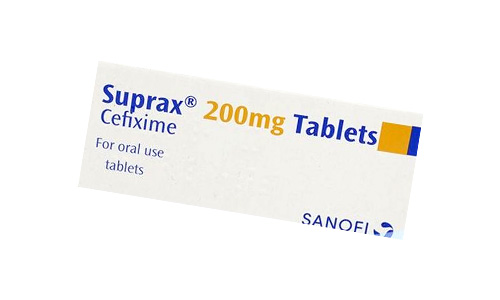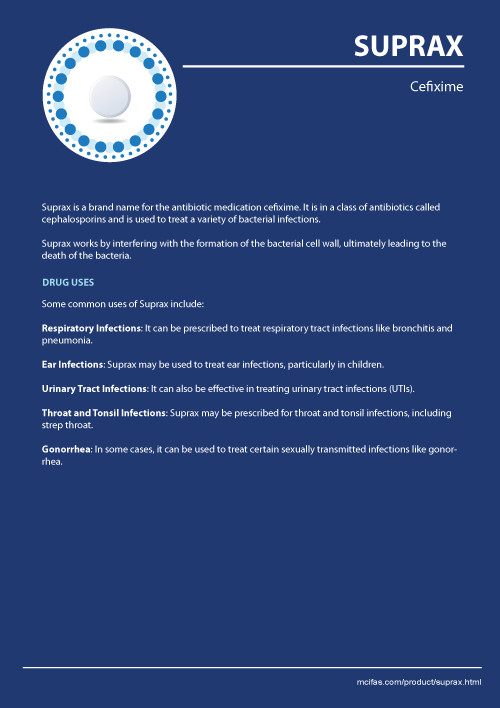Suprax Prescribing Information
Suprax is a brand name for the antibiotic medication cefixime. It is in a class of antibiotics called cephalosporins and is used to treat a variety of bacterial infections.
Antibiotic works by interfering with the formation of the bacterial cell wall, ultimately leading to the death of the bacteria.

Uses of Suprax
Some common uses include:
- Respiratory Infections: It can be prescribed to treat respiratory tract infections like bronchitis and pneumonia.
- Ear Infections: Suprax may be used to treat ear infections, particularly in children.
- Urinary Tract Infections: It can also be effective in treating urinary tract infections (UTIs).
- Throat and Tonsil Infections: Suprax may be prescribed for throat and tonsil infections, including strep throat.
- Gonorrhea: In some cases, it can be used to treat certain sexually transmitted infections like gonorrhea.
Dosage
The appropriate dosage of Suprax can vary depending on the type and severity of the infection being treated, as well as your age, weight, and overall health. It's crucial to follow instructions or the label on your prescription. Here are some general guidelines dosages in adults and children:
For Most Infections in Adults and Adolescents (12 years and older):
- The usual dose is 400 mg (milligrams) taken orally once a day or divided into two doses of 200 mg each, depending on the severity of the infection.
- In some cases, a higher dose may be prescribed for more severe infections.
- The duration of treatment can vary, typically ranging from 7 to 14 days. It's essential to complete the full course of antibiotics, even if you start feeling better.
For Children (6 months to 12 years old):
- The dosage depends on the child's weight and the specific infection being treated.
- Pediatric dosages are typically lower than those for adults, and they may be given in a liquid form for easier administration.
Gonorrhea Treatment:
- For the treatment of uncomplicated gonorrhea, a single 400 mg oral dose is often prescribed.
Renal (Kidney) Impairment:
- If you have kidney impairment, your healthcare provider may need to adjust the dosage of Suprax based on your kidney function. This is because the drug is primarily excreted through the kidneys.
Do not stop taking it early, even if your symptoms improve, as this could lead to incomplete treatment and potential antibiotic resistance.
If you miss a dose, take it as soon as you remember. If it's close to the time for your next scheduled dose, skip the missed dose and continue with your regular dosing schedule. Do not take a double dose to make up for a missed one.
Side Effects of Suprax
Suprax is generally considered safe and well-tolerated, but like all medications, it can potentially cause side effects. Not everyone will experience these side effects, and some individuals may experience mild symptoms, while others may experience more severe reactions. Common side effects may include:
Gastrointestinal Effects:
- Diarrhea
- Nausea
- Vomiting
- Abdominal pain or discomfort
Allergic Reactions:
- Skin rash
- Itching
- Hives (urticaria)
- Swelling of the face, lips, tongue, or throat (angioedema)
- Difficulty breathing or swallowing
Other Common Side Effects:
- Headache
- Dizziness
- Changes in taste
It's worth noting that diarrhea is a relatively common side effect of many antibiotics, including Suprax. However, if you develop severe or persistent diarrhea, especially with signs of blood or mucus in the stool, it could be a sign of a more serious condition called pseudomembranous colitis, which requires immediate medical attention.
Additionally, while Suprax is generally well-tolerated, it can, in rare cases, lead to more severe side effects, such as:
- Severe skin reactions (Stevens-Johnson syndrome)
- Severe abdominal or stomach pain
- Unusual tiredness
- Yellowing of the eyes or skin (jaundice)
- Dark urine
- Signs of a new infection
These severe side effects are rare but require immediate medical attention if they occur.
Interaction with other drugs
Suprax can interact with other drugs, potentially affecting their effectiveness or causing adverse reactions. Here are some notable drug interactions:
- Antacids, Proton Pump Inhibitors (PPIs), and H2 Blockers: These medications, commonly used to treat stomach acidity and heartburn, can reduce the absorption of Cefixime when taken simultaneously. To minimize this interaction, it's advisable to take Suprax at least 2 hours before or after antacids, PPIs (e.g., omeprazole, esomeprazole), or H2 blockers (e.g., ranitidine, famotidine).
- Iron Supplements: Iron supplements can decrease the absorption of Cefixime. It's recommended to separate the administration of iron supplements from Suprax by at least 2 hours.
- Warfarin: Suprax may increase the effects of the blood thinner warfarin, potentially leading to an increased risk of bleeding. Close monitoring of your INR (International Normalized Ratio) is advisable if you are taking both medications simultaneously.
- Oral Contraceptives: There have been reports of decreased contraceptive effectiveness when oral contraceptives are used alongside antibiotics. It is advisable to use an additional form of contraception while taking Suprax to ensure protection against pregnancy.
- Loop Diuretics: Concurrent use of Suprax with loop diuretics (e.g., furosemide) may increase the risk of kidney dysfunction.
- Probenecid: Probenecid can slow down the elimination of Suprax from the body, potentially leading to higher levels of the antibiotic.
- Other Antibiotics: Concurrent use of Suprax with other antibiotics, especially aminoglycosides (e.g., gentamicin) and certain penicillins, may increase the risk of adverse effects or reduce the effectiveness of one or both drugs.
- Methotrexate: Medicine may increase the concentration of methotrexate in the body, potentially leading to an increased risk of methotrexate-related side effects. Close monitoring of methotrexate levels and potential dose adjustments may be necessary.
What to avoid while on Suprax
While taking Suprax or any antibiotic medication, it's important to be aware of certain things to avoid to ensure the medication's effectiveness and your overall well-being. Here are some general guidelines for what to avoid:
- Alcohol: It's advisable to avoid alcohol while taking Suprax. Alcohol can interact with antibiotics and may reduce their effectiveness or increase the risk of side effects. Additionally, alcohol can impair your immune system, making it harder for your body to fight off the infection.
- Antacids, Proton Pump Inhibitors (PPIs), and H2 Blockers: As mentioned earlier, these medications used to treat stomach acidity should be taken separately from Suprax by at least 2 hours to prevent interactions that may reduce the absorption of the antibiotic.
- Iron Supplements: To maximize the absorption of Suprax, take iron supplements at least 2 hours before or after taking the antibiotic to prevent interference with absorption.
- Dairy Products: Some dairy products, especially those high in calcium, can interfere with the absorption of cefixime. It's best to take Suprax with a full glass of water on an empty stomach, at least 1 hour before or 2 hours after a meal.
- Oral Contraceptives: If you are taking oral contraceptives (birth control pills), consider using an additional form of contraception (e.g., condoms) while on Suprax. Antibiotics can potentially reduce the effectiveness of hormonal contraceptives.
- Certain Foods: While there are no specific dietary restrictions while taking Suprax, it's a good idea to avoid foods that may exacerbate your symptoms or irritate your stomach, especially if you experience gastrointestinal side effects. Spicy, greasy, or overly acidic foods may be best avoided.
- Driving and Operating Machinery: If Suprax causes dizziness or other side effects that impair your ability to concentrate or operate machinery, avoid driving or performing tasks that require mental alertness until you are sure you can do so safely.
- Excessive Sun Exposure: Some people may experience increased sensitivity to sunlight while taking antibiotics. While Suprax is not generally associated with this side effect, it's advisable to protect your skin from excessive sun exposure and use sunscreen if you spend time outdoors.
Contraindications of Suprax
Suprax has contraindications, which are specific situations or medical conditions in which the use of this medication is not recommended due to the potential risks outweighing the benefits. Here are some contraindications:
- Known Allergy to Cefixime or Cephalosporin Antibiotics: If you have a known allergy to cefixime or any other cephalosporin antibiotic, you should not take Suprax. Allergic reactions can range from mild rashes to severe and life-threatening reactions like anaphylaxis.
- Severe Allergic Reaction to Penicillin or Other Beta-Lactam Antibiotics: While cross-allergies between cephalosporins (like Suprax) and penicillins are less common than once thought, individuals who have experienced a severe allergic reaction to penicillins may have an increased risk of cross-reactivity with cephalosporins. In such cases, the use of Suprax should be carefully considered, and alternative antibiotics may be preferred.
- Colitis (Clostridium difficile-Associated Disease): Suprax, like many antibiotics, can disrupt the balance of normal gut bacteria and potentially lead to the overgrowth of Clostridium difficile bacteria, causing colitis. If you have a history of colitis or are suspected to have it, Suprax should be used with caution or avoided, as it can worsen this condition.
- Renal (Kidney) Impairment: Individuals with severe renal impairment or end-stage renal disease may require dosage adjustments or should avoid Suprax altogether. The drug is primarily excreted through the kidneys, and impaired kidney function can lead to increased levels of the medication in the bloodstream.
- Pediatric Patients with Hypersensitivity to Penicillins: In pediatric patients with known or suspected hypersensitivity to penicillins (especially those with severe reactions like anaphylaxis), the use of Suprax should be approached with caution.
Pregnancy and Suprax
The use of Suprax during pregnancy should be carefully considered, and it should only be prescribed if the potential benefits outweigh the potential risks. Here are some important points to consider regarding pregnancy:
- Risk Category: Medicine is generally classified as a Category B medication for pregnancy by the U.S. Food and Drug Administration (FDA). This means that animal studies have not shown any direct harm to the fetus, but there are limited human studies available. The actual risk to pregnant women and their developing babies is not fully understood.
- Timing and Dosage: If Suprax is prescribed during pregnancy, it is typically recommended to use the lowest effective dose for the shortest duration necessary to treat the infection. This can help minimize potential risks to the developing fetus.
- Breastfeeding: Suprax may pass into breast milk, and its safety during breastfeeding has not been well studied.
» Drug Uses (format pdf, 0.2 Mb)



